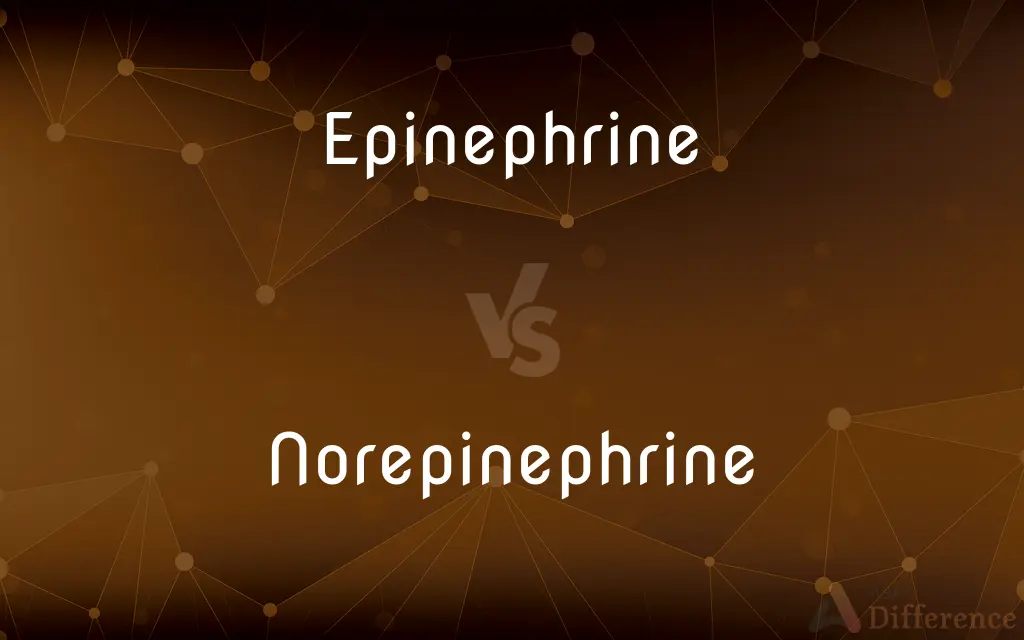Epinephrine vs. Norepinephrine — What's the Difference?
By Fiza Rafique & Maham Liaqat — Updated on March 25, 2024
Epinephrine, also known as adrenaline, triggers fight-or-flight responses, enhancing heart rate and airflow. Norepinephrine, or noradrenaline, primarily increases blood pressure and alertness, with less impact on heart rate.

Difference Between Epinephrine and Norepinephrine
Table of Contents
ADVERTISEMENT
Key Differences
While both hormones are critical in stress responses, epinephrine has a broader range of actions, including opening up the airways to improve oxygen flow, which is crucial for intense physical activity. Norepinephrine, on the other hand, has a more focused effect on maintaining blood pressure and has less impact on heart rate and airflow compared to epinephrine. This difference underscores their roles in the body’s adaptation to stress.
In terms of their production, epinephrine is mainly produced in the adrenal medulla—the inner part of the adrenal glands—while norepinephrine is produced in both the adrenal glands and the brainstem. This distribution hints at norepinephrine's additional roles in mood regulation and cognition, where it acts more widely as a neurotransmitter in the central nervous system.
Despite their differences, both epinephrine and norepinephrine are essential for the body’s response to stress. They work together to ensure that the body can respond appropriately to emergencies, with epinephrine mobilizing the body for action and norepinephrine fine-tuning vascular response and maintaining alertness.
Comparison Chart
Also Known As
Adrenaline
Noradrenaline
Effects on Heart
Increases heart rate
Less impact on heart rate
ADVERTISEMENT
Effects on Airways
Opens airways
Minimal direct effect
Medical Use
Treats anaphylactic shock
Treats low pressure
Production Site
Adrenal medulla
Adrenal glands and brainstem
Compare with Definitions
Epinephrine
A hormone enhancing fight-or-flight responses.
Epinephrine levels spike during intense physical or emotional stress.
Norepinephrine
Produced in the adrenal glands and brainstem.
Norepinephrine production in the brainstem plays a role in alertness and arousal.
Epinephrine
Used medically to treat severe allergic reactions.
The doctor administered epinephrine to counteract the anaphylactic shock.
Norepinephrine
Less impact on heart rate compared to epinephrine.
Norepinephrine's primary role is to maintain blood pressure, not heart rate.
Epinephrine
Increases heart rate and airflow.
Epinephrine injections can save lives by quickly improving breathing and heart function.
Norepinephrine
Used to treat life-threatening low blood pressure.
In critical care, norepinephrine can stabilize patients with shock.
Epinephrine
Produced mainly in the adrenal medulla.
The adrenal glands release epinephrine in response to stress.
Norepinephrine
Acts as a neurotransmitter in the brain.
Norepinephrine levels affect mood and cognitive functions.
Epinephrine
Broad action spectrum in stress response.
Epinephrine prepares the body for rapid physical action in emergencies.
Norepinephrine
Norepinephrine (NE), also called noradrenaline (NA) or noradrenalin, is an organic chemical in the catecholamine family that functions in the brain and body as both a hormone and neurotransmitter. The name "noradrenaline", derived from Latin roots meaning "at/alongside the kidneys", is more commonly used in the United Kingdom; in the United States, "norepinephrine", derived from Greek roots having that same meaning, is usually preferred.
Epinephrine
A white to brownish crystalline compound, C9H13NO3, isolated from the adrenal glands of certain mammals or synthesized and used in medicine as a heart stimulant, vasoconstrictor, and bronchial relaxant.
Norepinephrine
(neurotransmitter) A neurotransmitter found in the locus coeruleus which is synthesized from dopamine.
Epinephrine
(medicine) A catecholamine hormone and neurotransmitter; as a hormone, secreted by the adrenal gland in response to stress (when it stimulates the autonomic nervous system); as a neurotransmitter, synthesized from norepinephrine. It is also used as a medication.
Norepinephrine
A hormone (C8H11NO3) secreted by the adrenal medulla; it also serves as a neurotransmitter, released at synapses; called also noradrenaline. Chemically it is 2-amino-1-(3,4-dihydroxyphenyl)ethanol. It is a precursor of epinephrine in the body.
Epinephrine
A catecholamine secreted by the adrenal medulla in response to stress (trade name Adrenalin); stimulates autonomic nerve action
Norepinephrine
A catecholamine precursor of epinephrine that is secreted by the adrenal medulla and also released at synapses
Common Curiosities
Can epinephrine and norepinephrine be used in medical treatments?
Yes, epinephrine is used for severe allergic reactions, and norepinephrine for life-threatening low blood pressure.
What role does norepinephrine play in the central nervous system?
Norepinephrine acts as a key neurotransmitter in the central nervous system, influencing alertness, arousal, and mood.
What are the main functions of epinephrine and norepinephrine?
Epinephrine triggers the fight-or-flight response, while norepinephrine increases blood pressure and alertness.
What are the psychological effects of norepinephrine?
Norepinephrine affects mood and cognitive functions, acting as a neurotransmitter in the brain.
Why is epinephrine critical in emergency medical situations?
Epinephrine can quickly reverse severe allergic reactions and improve breathing and heart function, saving lives in emergencies.
How do epinephrine and norepinephrine affect heart rate?
Epinephrine significantly increases heart rate, whereas norepinephrine has less impact on it.
Where are epinephrine and norepinephrine produced in the body?
Epinephrine is mainly produced in the adrenal medulla, and norepinephrine in both the adrenal glands and the brainstem.
How do epinephrine and norepinephrine work together in stress responses?
They ensure a comprehensive physiological response to stress, with epinephrine handling the immediate mobilization of the body and norepinephrine fine-tuning vascular response and maintaining mental alertness.
What is the difference in the roles of epinephrine and norepinephrine during stress?
Epinephrine mobilizes the body for action, while norepinephrine focuses on maintaining blood pressure and alertness.
How do epinephrine and norepinephrine affect the airways?
Epinephrine opens up the airways to improve oxygen flow, while norepinephrine has minimal direct effect on the airways.
Share Your Discovery

Previous Comparison
Guatemalan vs. Mexican
Next Comparison
Stronger vs. StrongAuthor Spotlight
Written by
Fiza RafiqueFiza Rafique is a skilled content writer at AskDifference.com, where she meticulously refines and enhances written pieces. Drawing from her vast editorial expertise, Fiza ensures clarity, accuracy, and precision in every article. Passionate about language, she continually seeks to elevate the quality of content for readers worldwide.
Co-written by
Maham Liaqat













































